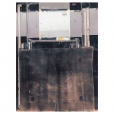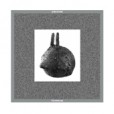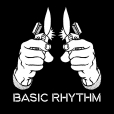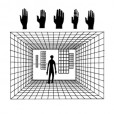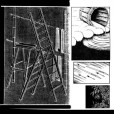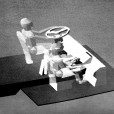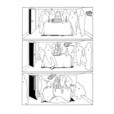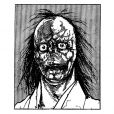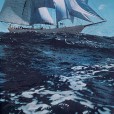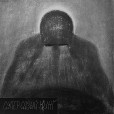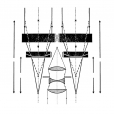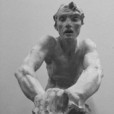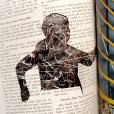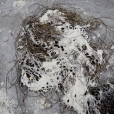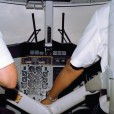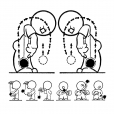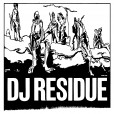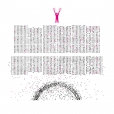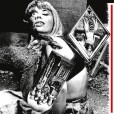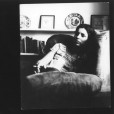Your basket is empty

‘The surrealist, psychedelic brain-burps of notorious all-caps-tweeting wind-up-merchant Louis Johnstone aka Wanda Group. Twenty-six congealed morsels of spur-of-the-moment
sound-art executed with genuine economy of means, namely… a phone. An impulsive, scatter-brained trip into the inner circles of regional weirdness, secreting a creeping unease which really gets under your skin. Fragments of aural rubble haphazardly cohere into galvanising spacial tones and textures, punctured by Johnstone’s garbled Essex rantings. The long-distance stare of warbled tape loops is abruptly fractured by a drunken sing-along in a care home for the elderly. As hallucinogenic takes on the utterly mundane, there’s an obvious kinship with Lambkin’s nocturnal, straight-to-dictaphone sound-pieces. Dan Johannsen’s splintered classical collages on that PIG tape and the suburban soliloquies of Regional Bears alumnus Russell Walker also feel closely aligned.’ (All Night Flight)
With an A4 riso insert.
Eight charged, intimate meditations by Julie Normal and Olivier Demeaux, playing a rickety ondes Martenot and an old church harmonium.
Gripping, detailed, stately improvisation — a bit like the ùrlars in classical bagpipe music — which nervily mixes the sternly doom-laden with precarious, other-worldly wonderment.
(The ondes Martenot is an amazing twentieth-century instrument — beloved by Messiaen, for example, and Varese. The theme-song of Star Trek is a vocal forgery of its sound. ‘J’aime cette fragilité qui côtoie la capacité de te décoller le tympan sur certaines fréquences inopinément,’ says Julie. ‘Je tiens une bombe dans les mains. J’aime son instabilité, son humanité.’)
Wood, breath, blood, eggshells… on the night of a purple moon.
Very warmly recommended.
A cosmic, percussive jam and bitter-sweet electroid house — both veering sharply into dark, steely, dubwise self-harm. Allegedly the fiftieth utterance of our favourite dance music label in the world. Hats off! More worries!
None other than Blawan on his lonesome ownsome — after collaborations with Pariah as Karenn, and Surgeon as Trade — returning to the blood-drenched scene of his heinous Why They Hide Their Bodies.
New name, new sound; heavier and slower than his Ternesc output. The title track is the banger. Acid techno — deliberate, widescreen and ominous.
Beau Wanzer + Rezzett = maximum worries squared. Five frazzlers for all us nutters in the dance. Borez they izn’t.
Bracing portions of the screaming abdabs dressed as naked, hooligan machine-funk — fizzing, stomping, juddering and going mental in the furnace of high noon like whizzed-up children of the hydra’s teeth.
Snoopy is hard to follow up. The same brilliant musicality is lavished on Orange — a combination of unmistakably original, skittering drum programming, startlingly fresh instrumental interjections, creepily invocatory voices, and dubwise treatments — giddily imbued with the dark arts of ritual and seance. But Orange is more gripping, focussed and urgent, more intense and ambitious. Next level.
Its first quarter presents a trio of forays in suspense.
Bassline squares up like an epic psych-funk grinder, with a moody guitar line traversed by ticking drum patterns and faint electric crackle. In no time the guitar is staggering and stammering under the duress of echo and distortion, and over-run with percussive electronics and the first of the voices massing in the music’s head. The mood has quickly become more trepidatious. We’re deeper underground; it’s gloomier, wetter.
Shred propulsively ratchets up the tension and menace. Glazily tentative xylophone is played against slashing, nervy cello. The voices are more strangulated and sick now. Flutes and chimes evoke the same kind of beautiful, contaminated efflorescence which is pictured on the LP’s front cover.
Voice Of The Spider makes easier progress across this cavernous, shadowy, dripping terrain, with funky pads and Nasty, eighties, No Wave electric bass; woozy chimes, non-plussed keys, singing-in-tongues.
Pink Mist marks an arrival, or unbottling, with annunciatory church-organ and choral voices from the off, and a newly relaxed, head-nodding kosmische rhythm.
Mandarin is a short, beat-less and voice-free interlude for piano and bass. It’s reflective and nostalgic, ambivalent and inconclusive, with a lovely snatch of melody. A bridge half-way.
Would You Like A Vampire is a triumphant, mesmerizing go at New Folk, with strummed acoustic guitar, descant song, and jazzily restless drum programming (including a tasty bass-bin trembler). Amazingly, Conrad Standish is joined at the mic by none other than Bridget St John. Together they sing ‘Earth is Paradise’ so repeatedly and tremulously — and the song is cut off so abruptly at the end — it seems as if the verb is teetering on the past tense, and hymn fading into valediction and catastrophe.
In the same line of thought, Storm Rips Banana Tree begins idyllically enough, with a CS-&-Kreme-style raga… before something like an immense, obliterative drill starts up. Harpsichord and organ — by James Rushford — and flutes, and clapping, distant chanting and insectile percussion steadily leaven the dread, till finally all that is left is lapping water.
It’s an epic, deeply immersive, compelling, thought-provoking, twenty-minute finale… the coup de grâce.
You can’t make sense of this, clicking through mp3s, on tin-pan computer speakers. Put the record on, though, and set the controls for the heart of the bloke next door, and it’s terrific. The drum-less, throbbing, droning, wailing, sawing, twinkling reconnaissance of Nothing, with massive, unnerving swoops, throttling and surges.
Beatrice Dillon and Kassem Mosse.
Great photos by Anne Tetzlaff on the sleeve.
Prime Cuts from the legendary Scratch Perverts crew with an upful six-tracker, full of life and intelligence, and teeming with fidgety, DIY, turntablist energy.
For us it’s a bit like a raid on the racks at Honest Jons, over the decades… but fresh and bright. It kicks off with a headlong garbling of eighties jazz-funk, complete with synths, a vocoder, and some incipient Herbie, all sagging woozily into some nuts pitch control, before a mean beat-down. Some dubwise Channel One follows up, with almightily anthemic snatches of melody and unmistakable chords, almost breaking down under a barrage of skittering effects, scratching, laser-fire, strangulated melodica, and cowbell. Then three excursions in classic Detroit techno: moody electro funk, with a sprinkling of Harold Faltermeyer; hard-grooving minimalism, with a dash of It Takes Two; then a more industrial outing, with clattering percussion and gobbling synth. Finally an ambient interlude — overcast but twinklingly ambivalent — to close.
Ace. A lot of fun. Check it out.
Kassem Mosse worries.
A second killer Trilogy EP from DJT in Japan, advancing the legacy of Chain Reaction.
Serious, emotionally reined-in music; structurally minimal, linear and open-ended, without the puppeteering routines of most dance music… but all the more enthralling and grooving, with hefty bass. The sense of monumental, weather-distressed, darkening dread is counter-balanced by this forward momentum, and expertly dubwise light-and-shade, with layered detail.
The reverberative, gong-like tolling of the opener gives way on the flip to machines starting up in a cavernous space, like vast beating wings, with a tumping bottom end, over nine minutes.
In-between is a more atmospheric and tentative interval, with slowly roiling synths and near-and-far, morse-code percussion.
Ace.
Massive bounce to the ounce on the A-side, guaranteed to boing a dancefloor into a vibrational mess.
Four honed earhole sluicers, on the flip.

